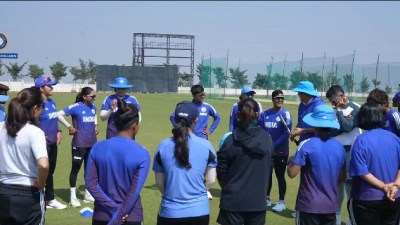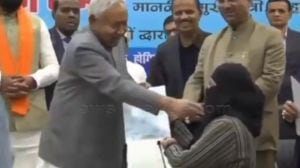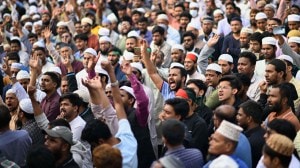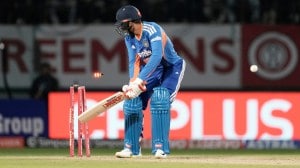THE RACE for the Scheduled Caste-reserved seats in the Delhi Assembly, for which elections are due next, is expected to be heated this time in the wake of the row over Union Home Minister Amit Shah’s statement on Dr B R Ambedkar.
The ruling Aam Aadmi Party (AAP) has moved quickly to cash in, releasing an AI-generated video in which Ambedkar can be seen “blessing” AAP national convener Arvind Kejriwal, with both dressed in blue (a colour adopted by Ambedkar), against a backdrop of the India Gate.

In the past, the SC-reserved seats in Delhi have been won by either the Congress, before the AAP dominance began, and by Kejriwal’s party since. The last time the BJP made any sort of impact in these seats was in 1993, when it came to power in the Capital (it has not managed so since). At the time, the BJP won 49 of the 70 Assembly seats in Delhi, including eight of the 13 SC seats. Since then, the BJP’s best performance has been two of these constituencies.
In 1993, the Congress had won 14 seats in Delhi, with five of them SC constituencies. In 1998, when it swept to power, the Congress won 52 seats, including all the 13 reserved seats. Voted back to power in 2003 and 2008, albeit with fewer seats at 47 and 42, respectively, the Congress continued to dominate in the SC seats. While it won 11 and lost two to the BJP in 2003, it won nine and lost two to the BJP and one to the BSP in 2008.
 Performance in Delhi SC seats
Performance in Delhi SC seats
The 2013 elections saw the entry of the AAP, and a hung Assembly. While the BJP emerged as the single-largest party, the Congress lent outside support to help the AAP form the government. That election saw the AAP net 28 seats overall, nine of them SC seats. While the Congress fell to just one SC seat and eight seats overall, the BJP won 32 seats, including two SC seats.
In the next two elections, the AAP swept all the 12 SC seats in Delhi, en route to returning to power in 2015 and 2020. The AAP’s dominance was overwhelming – it won 67 and 62 seats, respectively, with the remaining seats going to the BJP in these two polls. With the Congress seen as a minor force in the Delhi Assembly elections, the upcoming fight is likely to be between the ruling AAP and BJP again.
In 1993, when the BJP notched its best performance in Delhi, in SC-reserved seats, it had got a 36.84% vote share, narrowly beating out the Congress at 35.68%.
Story continues below this ad
 Vote shares in Delhi SC seats
Vote shares in Delhi SC seats
In 1998, the Congress came to power with a 53.89% vote share in the SC seats, far ahead of the BJP at 28.6%. The margins in SC seats were similarly large in 2003 – when the Congress got a 50.36% vote share compared to the BJP’s 32.05% – and again in 2008 – when the Congress got 44.66% and the BJP 31.69%.
While the 2013 contest narrowed the field in terms of vote share in SC seats – the AAP led with 34.56%, followed by the BJP at 28.78% and the Congress at 23.86% – the AAP led the vote share fight by considerable margins in 2015 and 2020. In 2015, the AAP secured 58.88% of the votes in SC seats, compared to the BJP at 27.24% and the Congress at 9.1%. In 2020, the AAP got a 57.7% vote share, followed by the BJP at 33.76% and the Congress at just 3.97%.
Widening gap
Following the recent general trends in Delhi polls, which have seen the AAP maintain a sizeable lead over its rivals, in SC-reserved seats too the fight has been between two primary contenders, with smaller parties having little impact on the outcomes. For instance, in the previous two Assembly polls, the third-place candidate won more votes than the winner’s margin in just one SC seat. In contrast, the third-place candidate won more votes than the margin in all 12 SC seats in 2013. The Congress was the primary vote-cutter in 2013 – it got more votes than the winning margin in eight SC seats, hurting the BJP in at least seats that the AAP ultimately won.
In 2003 and 2008, it was the BSP that cut into others’ votes – it got more votes than the margin in three SC seats in 2003 and six SC seats in 2008. Of late though, the BSP has become a minor player in Delhi, the party had played a significant role in the 2003 and 2008 Assembly polls, securing vote shares of 11.2% and 18.6%, respectively, the SC seats. It won its only SC seat in Delhi Assembly seat in 2008. Since then though, its presence in SC seats has diminished – its vote share fell to 7.99% in 2013, and then further to 3.73% and 1.2%, respectively, in 2015 and 2020.
Story continues below this ad
The BJP’s Assembly poll struggles have, however, not carried into its Lok Sabha performances. The BJP swept all seven Lok Sabha seats in Delhi in each of the last three elections. In the 2024 Lok Sabha polls, Assembly segment-level data shows that the BJP led in nine SC-reserved segments, the Congress in two and the AAP in just one.
The AAP, in a response, said it is the only party that has truly followed the principles enshrined in the Constitution, focusing on equal education and healthcare for all. “Union Home Minister Amit Shah must apologise for his comments on the framer of the Constitution, our idol Babasaheb Ambedkar. It is only because of the equal right to vote given to 140 crore Indians by Babasaheb, that BJP leaders are seen touching and washing the feet of Dalits during elections,” it said.
The BJP, however, has claimed that the “delusion” in the public about the AAP is falling away. Delhi BJP spokesperson Praveen Shankar Kapoor said, “People are well aware that Arvind Kejriwal did not do a single work in Delhi in the memory of B R Ambedkar in 10 years. Kejriwal never visited the memorial on 26, Alipur Road (Dr Ambedkar National Memorial) in Delhi that was in front of his residence. The Prime Minister had got that memorial developed. We will raise all that in the polls.”
The Congress, an AAP ally at the national level, also targeted the AAP for “only making announcements and doing nothing for Dalits on the ground”. “The traditional core vote of the Congress had moved to the AAP in the past but we are seeing an atmosphere this time showing that Dalits are once again returning to its old party, the Congress. There will be change in all 12 SC-reserved seats,” said Anil Bhardwaj.



 Performance in Delhi SC seats
Performance in Delhi SC seats Vote shares in Delhi SC seats
Vote shares in Delhi SC seats





























